
Read news about operating systems and the future of computing. Areas of interest include forums and discussion groups.
- Subject:
- Information Science
- Material Type:
- Lesson
- Date Added:
- 11/12/2010

Read news about operating systems and the future of computing. Areas of interest include forums and discussion groups.
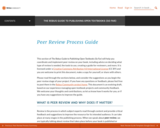
This section of The Rebus Guide to Publishing Open Textbooks (So Far) will help you coordinate and implement peer review on your book, including advice on deciding what type of review is needed, the tools to use, creating a guide for reviewers, and more. It is licensed under a Creative Commons Attribution 4.0 International License (CC BY) and you are welcome to print this document, make a copy for yourself, or share with others.
Please read through the sections below, and consider the suggestions as you begin the peer review stage of your project. If you have any questions or feedback, please feel free to post them in the Rebus Community project home. This document is an evolving draft, based on our experience managing open textbook projects and community feedback. We welcome your thoughts and contributions, so let us know how it works for you, or if you have any suggestions to improve the guide.
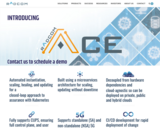
Articles and technical information about data communication and telecommunication protocols.
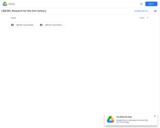
Upon completion of this course, students will be able to: develop and research a topic of global significance; recognize authorsŰŞ arguments and the political, social and economic motivations behind their work; demonstrate the ability to locate, interpret and cite the relevant and appropriate information resources on a topic; and, demonstrate an understanding of the information research process.Login: guest_oclPassword: ocl
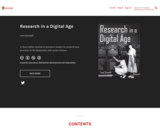
A short online tutorial to introduce readers to research best-practices in the humanities and social sciences.
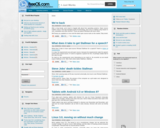
Provides articles, documentation, links to software, and news about Linux and other operating systems.

Computer Security Education and Information Security Training
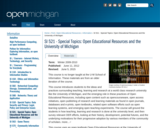
This course is no longer taught at the U-M School of Information. These materials are from an older iteration of the course.
This course introduces students to the ideas and practices surrounding teaching, learning and research at a world class research university like the University of Michigan, and the emerging role in these practices of Open Educational Resources, including open content such as opencourseware, open access initiatives, open publishing of research and learning materials as found in open journals, databases and e-prints, open textbooks, related open software efforts such as open learning systems, and emerging open teaching experiments. The course will ground the students in how teaching, learning and research is done at the university level, and then survey relevant OER efforts, looking at their history, development, potential futures, and the underlying motivations for their progressive adoption by various members of the community of scholars. more...
This course uses an open textbook Open Educational Resources at the University of Michigan. The articles in the open textbook (wikibook) were written by the School of Information Graduate students in the class.
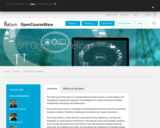
The smart grid of the future is a complex electrical power system. Its study, design, and management requires the integration of knowledge from various disciplines including sustainability, technology and mathematics.
Smart grids show a level of complexity and heterogeneity that often cannot be covered by analytical methods. Therefore, modeling and simulation are of great importance.
In this course, you will apply modeling tools to study and analyze the performance of your self-designed intelligent electrical power grid. By modeling smart grids, you will explore the integration of renewable energy sources into a grid, its dynamics, control and cyber security.
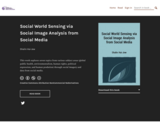
This work explores seven topics from various subject areas (global public health, environmentalism, human rights, political expression, and human predation) through social imagery and data from social media.
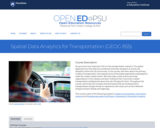
Do you know how important GIS is to the transportation industry? The spatial applications to this field are so extensive that they represent an entire sub-discipline within the GIS community. In this course, we'll learn about the primary modes of transportation and explore some of the spatial applications developed to meet the unique needs of each. We'll also take a close look at some key organizations in the industry and learn firsthand from more than a dozen transportation professionals about the role GIS plays for them. Throughout the course, we'll study GIS concepts and techniques that are fundamental to transportation and get hands-on experience with tools such as Esri's Network Analyst and Esri's Roads and Highways.
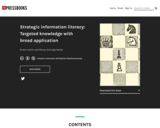
A living book designed to be revised, Strategic Information Literacy will remain relevant to casual and critical information consumers and creators so long as it applies to how they interact with information. The authors invite revision and redistribution of the book’s content to meet the information literacy needs of its readers.
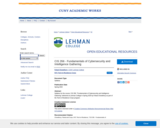
Syllabus for the course: CIS 356 - Fundamentals of Cybersecurity and Intelligence Gathering. Delivered at Lehman College in Spring 2020 by Fahad Chowdhury as part of the Tech-in-Residence Corps program.
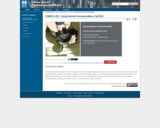
Using Internet Communication enhances students' theoretical understanding of electronic communication and their ability to communicate as professionals, scholars, and citizens using the Internet. Participants learn core communication theoretical models and principles, and apply them to electronic communication methods that enhance interpersonal, small group, and public interactions. These methods include electronic meetings, discussion forums, co-authoring tools, audio, and video.
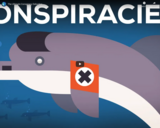
Most Conspiracy Theories are stupid. By the power of the internet they spread like wildfire and often poison discussions. But there is hope - we developed a way to debunk conspiracies in just a few seconds. The video "The Ultimate Conspiracy Debunker" is a resource included in the Information ethics topic made available from the Kurzgesagt open educational resource series.
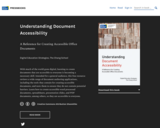
With much of the world gone digital, learning to create documents that are accessible to everyone is becoming a necessary skill. Intended for a general audience, this free resource reviews a wide range of document authoring applications, including the tools they contain for creating accessible documents, and tests them to ensure they do not contain potential barriers. Learn how to create accessible word processed documents, spreadsheets, presentation slides, and PDF documents, among others, so they are accessible to everyone.
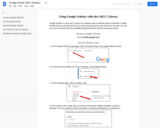
Handout about searching Google Scholar, adding library links, and finding full text.
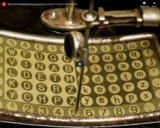
This resources is an online video available in the "World Science Festival" open education series. The video "Brian Snow describes how encryption machines can be compromised" is included in the Technology section of the series.
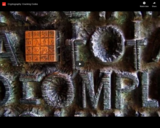
This resources is an online video available in the "World Science Festival" open education series. The video "Cryptography: Cracking Codes" is included in the Technology section of the series.
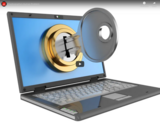
This resources is an online video available in the "World Science Festival" open education series. The video "Cryptography's Human Problem" is included in the Technology section of the series.